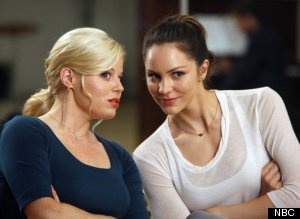

Last year, as "Smash" spun out into trainwreck status, fans and critics complained, cajoled and hate-watched, and despite the barbed nature of that last pastime, a good chunk of the grousing sprang from a sincere desire to see the show do better.
Be careful what you wish for.
"Smash" 2.0 is tidier; it's "better," I suppose, from an organizational perspective. It does away with the show's most groan-inducing characters and it introduces a rival musical that deflects a certain amount of attention away from "Bombshell," the increasingly tired Marilyn Monroe vehicle that still occupies center stage.
But, aside from a few musical performances and scattered scenes here and there, the new season isn't consistently compelling. It's oddly disconnected from the idea of art as transformation, the show's characters are thinly drawn and it's usually fairly easy to see where the story is heading.
Nobody's asking a soap about backstage strivers to approximate "Breaking Bad" levels of complexity or characterization, but "Smash" needs to be a lot more entertaining if it wants to get away with or at least disguise its weakest elements.
How's this for stubborn myopia? The out-of-town tryout for "Bombshell" -- which took place last season amid poisonings, infidelity and assorted off-stage shenanigans -- was apparently a triumph for the show. Whether or not "Bombshell" is a good show (and that's certainly open to debate, given what the TV audience has seen of it), the Marilyn Monroe musical just feels like an increasingly worn-out vehicle for various "Smash" subplots. Invoking the legacy of a charismatic star has not conferred any intriguing qualities on the musical, and for "Bombshell's" creative genesis to be interesting, we have to care about the characters at the center of it, and that's still a substantial problem.
The thing is, even if you magically combine Megan Hilty's curvy sass and Katharine McPhee's clean-scrubbed wholesomeness, the competing "Bombshell" leads wouldn't begin to approximate Monroe's essence. Monroe's appeal centered on a combination of unreachable sadness and uncontrollable sensuality, and these actresses just don't have it (or "it"). As Ivy, Hilty is perky and energetic, and as Karen, McPhee is a well-intentioned cipher without much screen presence. Monroe-esque they are not.
Weirdly enough, the fourth episode of the new season implies that the problem with "Bombshell" is that it's not sufficiently focused on its male characters, which is one of the most wrongheaded ideas I've heard in some time (Monroe was often defined by the men she was with, but wasn't the point of "Bombshell" to peel back those layers of appropriation?). In any event, characters on the show continue to fight for the survival of a project that feels less vital the more it's discussed.
Ultimately, the stakes in the "Bombshell" story feel so small because the people attached to the musical remain one-dimensional, for the most part. It doesn't help that Season 2 re-commits to the idea that Debra Messing's character Julia must frequently be Taught a Lesson, as if she's the Upper West Side's greatest monster instead of a garden-variety neurotic theater scribe. As was the case last season, Jack Davenport brings real bite and depth to his scenes as Derek, the show's arrogant director, but other cast members aren't particularly well-used in the three episodes I watched. Anjelica Huston, who plays "Bombshell's" lead producer, is capable of playing much more than a dragon-lady cartoon (her Sondheim number last year was one of Season 1's high points), but that's more or less what Eileen is this season.
There's also the problem of McPhee, whose acting talents are modest at best and wooden at worst. We learn in Season 2 that that she was praised by the press as the "Bombshell" lead, an idea that has traveled past laughable and has arrived in "stop it, please" territory. Jennifer Hudson turns up early in the season to lend some energy to the proceedings, and Hilty has a good number or two, but many of the musical interludes, like McPhee's presence, feel tame and perfunctory.
The exceptions are two songs written by a team of newcomers played by Jeremy Jordan and Andy Mientus; their tunes bristle with poppy momentum and energy, but their characters are silly stereotypes. Artistic types are temperamental! Artistic types live in disorderly Brooklyn lofts! Artistic types sneer at your middle-class ... something or other!
I was one of the people singing "Smash's" praises early in Season 1, and boy, did I feel stupid by the middle of the first season, which devolved into a big ol' chaotic mess. Individual episodes would dither about tone, storylines veered all over the place, and the prominence of certain characters (Ellis, Leo) seemed designed to give the audience collective aneurysms. The large cast was ill-served by nonsensical shenanigans that gave rise to hate-watching, and I know some people despise that term, but it's less cumbersome than "mourning-wasted-potential-and-venting-on-Twitter" watching. That's not as easy to say.
But the thing is, early in its first season, when we were just watching instead of hate-watching, "Smash" really did have something special going for it -- an understanding that art isn't just a job, it's is a way of transmuting pain and fear into a collective experience that can be captivating and transcendent.
This season, "Smash," which has traded theater-trained showrunner Theresa Rebeck for former "Gossip Girl" scribe Joshua Safran, is more linear and logical, but there are several instances in which catharsis is depicted without having been earned. Musical numbers are stuck in at "appropriate" intervals, but they are performed rather than felt. I didn't hate "Smash" this season, but I didn't love it either. It's moderately competent a decent amount of the time, I guess, but this house-trained, reined-in incarnation has left some of the magic behind.
Is it possible to ambivalence-watch a TV show? I'm honestly not sure whether I care enough to find out.
"Smash" returns with a two-hour premiere on Tues., Feb. 5 at 9 p.m. EST on NBC.

